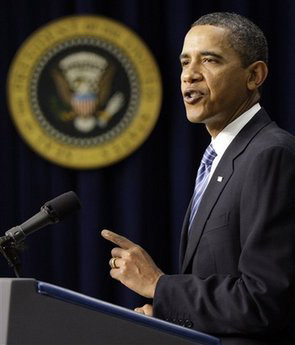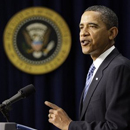Obama tells banks: 'We want our money back'
Associated Press
Wed January 13, 2010
WASHINGTON - President Barack Obama told banks Thursday they should pay a new tax to recoup the cost of bailing out foundering firms at the height of the financial crisis. "We want our money back," he said.
In a brief appearance with advisers at the White House, Obama branded the latest round of bank bonuses as "obscene." But he said his goal was to prevent such excesses in the future, not to punish banks for past behavior.
The tax, which would require congressional approval, would last at least 10 years and generate about $90 billion over the decade, according to administration estimates. "If these companies are in good enough shape to afford massive bonuses, they are surely in good enough shape to afford paying back every penny to taxpayers," Obama said.
Advisers believe the administration can make an argument that banks should tap their bonus pools for the fee instead of passing the cost on to consumers.
The president's tone was emphatic and populist, capitalizing on public antipathy toward Wall Street. With the sharp words, he also tried to deflect some of the growing skepticism aimed at his own economic policies as unemployment stubbornly hovers around 10 percent.
The proposed 0.15 percent tax on the liabilities of large financial institutions would apply only to those companies with assets of more than $50 billion - a group estimated at about 50. Administration officials estimate that 60 percent of the revenue would come from the 10 biggest ones.
They would have to pay up even though many did not accept any taxpayer assistance and most that did have repaid the infusions.
Obama said big banks had acted irresponsibility, taken reckless risk for short-term profits and plunged into a crisis of their own making. He cast the struggle ahead as one between the finance industry and average people.
"We are already hearing a hue and cry from Wall Street, suggesting that this proposed fee is not only unwelcome but unfair, that by some twisted logic, it is more appropriate for the American people to bear the cost of the bailout rather than the industry that benefited from it, even though these executives are out there giving themselves huge bonuses," Obama said.
He renewed his call for a regulatory overhaul of the industry and scolded bankers for opposing the tighter oversight in legislation moving through Congress.
"What I'd say to these executives is this: Instead of setting a phalanx of lobbyists to fight this proposal or employing an army of lawyers and accountants to help evade the fee, I'd suggest you might want to consider simply meeting your responsibility," Obama said.
At issue is the net cost of the fund initiated by the Bush administration to help financial institutions get rid of soured assets. The $700 billion Troubled Asset Relief Program (TARP) has expanded to help auto companies and homeowners.
Insurer American International Group, the largest beneficiary at nearly $70 billion, would have to pay the tax. But General Motors Co. and Chrysler Group LLC, whose $66 billion in government loans are not expected to be repaid fully, would not.
Administration officials said financial institutions were both a significant cause of the crisis and chief beneficiaries of the rescue efforts, should bear the brunt of the cost.
Bankers did not hide their objections.
"Politics have overtaken the economics," said Scott Talbott, the chief lobbyist for the Financial Services Roundtable, a group representing large Wall Street institutions. "This is a punitive tax on companies that repaid TARP in full or never took TARP."
Even before details came out, Jamie Dimon, chief executive of JPMorgan Chase & Co., said: "Using tax policy to punish people is a bad idea."
Obama is trying to accelerate terms that require the president to seek a way to recoup unrecovered money in 2013, five years after the law was enacted.
So far, the Treasury has given $247 billion to more than 700 banks. Of that, $162 billion has been repaid and banks have paid an additional $11 billion in interest and dividends.
In Congress, Democrats embraced Obama's proposal while Republicans rejected it.
"I think it is entirely reasonable to say that the industry that, A, caused these problems more than any other and, B, benefited from the activity, should be contributing," said Democratic Rep. Barney Frank of Massachusetts, chairman of the House Financial Services Committee.
But GOP Rep. Scott Garrett of New Jersey, who's on Frank's committee, called it a "job-killing initiatives that will further cripple the economy by increasing fees passed on to consumers and small businesses, while reducing consumer credit."





 Share your thoughts in the Forum
Share your thoughts in the Forum
